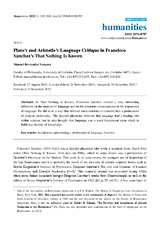Mostrar el registro sencillo del ítem
Plato’s and Aristotle’s Language Critique in Francisco Sanchez’s That Nothing Is Known
| dc.contributor.author | Bermúdez Vázquez, Manuel | |
| dc.date.accessioned | 2017-11-09T08:21:57Z | |
| dc.date.available | 2017-11-09T08:21:57Z | |
| dc.date.issued | 2012 | |
| dc.identifier.uri | http://hdl.handle.net/10396/15379 | |
| dc.description.abstract | In That Nothing Is Known, Francisco Sanchez created a very interesting reflection on the analysis of language and on the epistemic consequences of the importance of language. He did so in a way that allowed some scholars to consider him a predecessor of analytic philosophy. The Spanish physician believed that language had a leading role within science, but he also thought that language was a weak foundation upon which to build any attempt of knowledge. | es_ES |
| dc.format.mimetype | application/pdf | es_ES |
| dc.language.iso | eng | es_ES |
| dc.publisher | MDPI | es_ES |
| dc.rights | https://creativecommons.org/licenses/by/4.0/ | es_ES |
| dc.source | Humanities 1(3), 192-204 (2012) | es_ES |
| dc.subject | Skepticism | es_ES |
| dc.subject | Epistemology | es_ES |
| dc.subject | Philosophy of language | es_ES |
| dc.subject | Francisco Sánchez, "El Escéptico", 1551-1623 | es_ES |
| dc.title | Plato’s and Aristotle’s Language Critique in Francisco Sanchez’s That Nothing Is Known | es_ES |
| dc.type | info:eu-repo/semantics/article | es_ES |
| dc.relation.publisherversion | http://dx.doi.org/10.3390/h1030192 | es_ES |
| dc.rights.accessRights | info:eu-repo/semantics/openAccess | es_ES |

